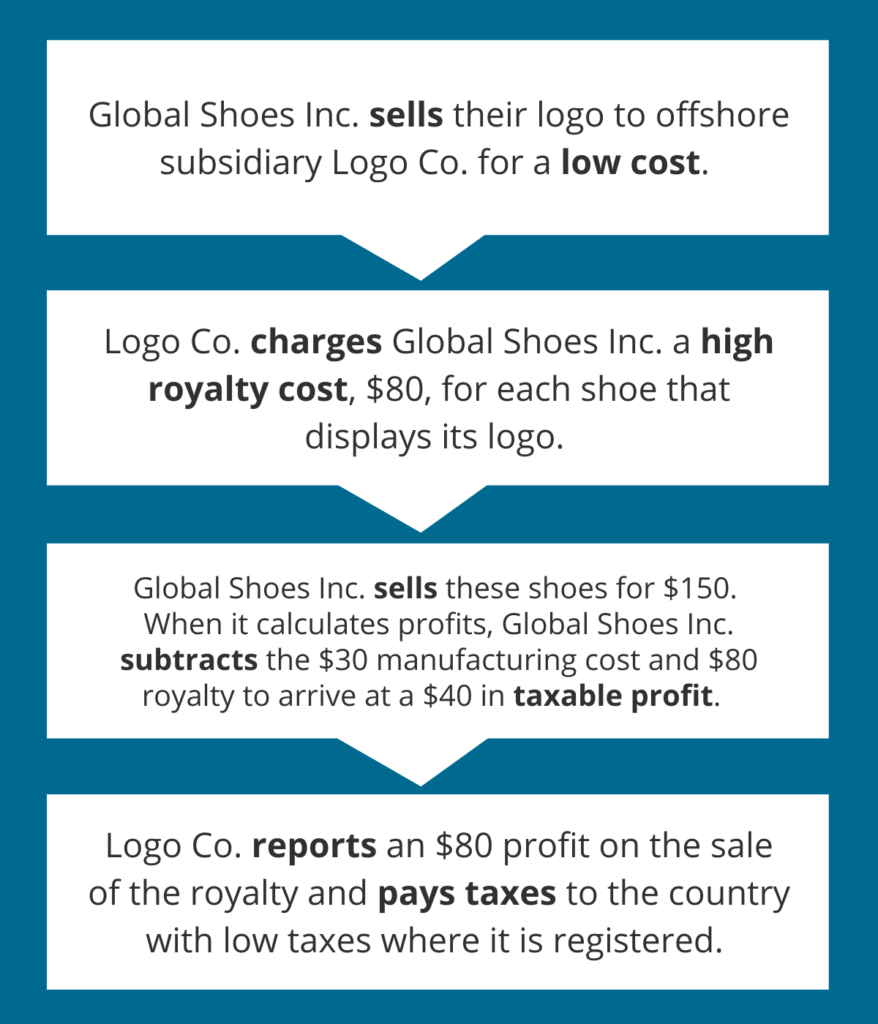By cleaning up loopholes in the corporate tax code that help corporations hide their US profits offshore, Maine can level the playing field for Main Street businesses and raise revenues that provide critical resources for workers and families throughout the state.
Since the end of the pandemic lockdowns in spring of 2020, profit margins and sales at major corporations have soared.1 But loopholes in Maine’s tax code let corporations exploit tax havens and strip our communities of benefiting as much as they could from higher corporate income tax revenues. Complete reporting, also known as worldwide combined reporting, would bring hidden profits out of hiding and game-proof Maine’s tax code to abusers of tax havens.
Corporate tax avoidance is costing Maine
Much of Maine’s corporate tax base is comprised of multinational corporations — such as Amazon, Walmart, Apple, Microsoft, and pharmaceutical companies — that sell goods in the state and are headquartered elsewhere. When these companies use offshore tax havens to avoid paying federal taxes, they lower their Maine tax bill, too.
Corporations pay taxes in Maine based on the percentage of their US sales that occur in the state. For example, a corporation that has 1 percent of its US sales in Maine would pay Maine corporate income taxes on 1 percent of its US profits. But when corporations hide US profits offshore, they aren’t counted in the federal or state tax base, resulting in a reduction of tax revenues in Maine. Each year, tax haven abuse costs the country $60 billion and Maine an estimated $52 million.2
Evolution of corporate structures to accommodate tax avoidance
As economies have become more globalized, US corporations have established offshoot partnership and subsidiary companies that facilitate sales to non-US markets, oversee manufacturing operations, and in some cases serve as a landing place to shift profits from US based sales out of the US tax base.
Corporations use a variety of accounting schemes to move profits off their US balance sheets and onto those of subsidiaries in countries with low taxes. The simplest of these schemes relates to pricing of intellectual properties such as logos and patents. Companies can also shift debt between subsidiaries to change which country is recording their profits.
Here’s an example of how an intellectual property scheme might work:

Many of the largest US multinationals use schemes like this to shift profits. For example, according to reporting by The Guardian, Amazon and McDonalds have entities in Luxembourg that collect royalties, Apple and Google have entities in Ireland, and Starbucks has one in the Netherlands.3
‘Water’s edge’ exposes Maine to offshore corporate tax avoidance
For fragmented corporations, states can choose to either tax each entity separately or tax related businesses as a single entity. In Maine, corporations combine their related businesses and file a single return.
But this only extends to the entities required to file federal corporate income taxes — those that do business within the country’s borders or ‘water’s edge’. This means some subsidiaries existing in tax havens remain out of reach of the Maine tax system.
Maine’s corporate tax rules require only business subsidiaries that file federal corporate taxes to report income on Maine tax forms. Often, this limits filings to corporations that do business within water’s edge or US borders, leaving out corporate subsidiaries that do not do business in the US but serve as housing for profit shifting outside of the US tax base.
Federal tax haven backstops are falling short
The 2017 tax bill created several provisions to partially address tax haven abuse. However, the Congressional Budget Office estimated that it would bring back into the US tax base only $65 billion of the $300 billion, less than a quarter, of the profits shifted annually.4
While Maine’s tax code piggybacks on these federal provisions and help recoup some of the corporate tax base lost to tax havens, they fall short of fully bringing offshore profits into play with Maine tax laws.
Complete reporting would bring tax haven profits out of hiding
Complete, or worldwide combined, reporting would require corporations and their subsidiaries to report global profits and pay taxes based on the portion of their business that is done in Maine. For example, the same shoe company and its foreign subsidiary from the previous example wouldn’t be able to skirt the tax code under complete reporting.
- At the end of the year, Global Shoes Inc. reports $150 million in sales. $135 million in sales were in the US including $5 million in Maine. The company and its subsidiary, Logo Co., reported $120 million in global profits but only $35 million in the US because of their profit shifting scheme.
- Under water’s edge, Global Shoes Inc. would owe taxes in Maine only on the apportioned share of the company’s US profits. Maine sales made up 3.7 percent of Global Shoes Inc.’s US profits so its taxable profits in the state would be $1.3 million.
- Under complete reporting, Global Shoes Inc. would owe taxes in Maine on the apportioned share of the company and its subsidiaries’ global profits. Maine sales made up 3.3 percent of global sales and the company and subsidiary would report $4 million in taxable profits in Maine.
Establishing a complete reporting system in Maine would stop the tax games played by multinational corporations and level the playing field for local businesses that are paying taxes fairly.
Notes:
[1] Dominick Reuter and Andy Kiersz. Dec 2, 2021. “Companies are pocketing their fattest profits in more than 70 years, even as they complain about inflation.” Business Insider. https://www.businessinsider.com/companies-pocket-largest-profits-in-70-years-amid-inflation-complaints-2021-12; Stan Choe. August 12, 2021. “S&P profits soar as companies pass inflation on to customers.” AP News. https://apnews.com/article/business-inflation-fc058cbd2ada9abe777adaf0c80f5404
[2] Richard Phillips. Nov 5, 2018 “Post-TCJA, international corporate tax system still leaking hundreds of billions in profits.” Institute on Taxation and Economic Policy. https://itep.org/post-tcja-international-system-still-leaking-hundreds-of-billions-in-profits/; Richard Phillips and Nathan Proctor. “A simple fix for a $17 billion loophole.” Institute on Taxation and Economic Policy and U.S. PIRG Education Fund. https://itep.org/a-simple-fix-for-a-17-billion-loophole/
[3] Simon Bowers. Feb 18, 2016. “Amazon: the obscure subsidiary at the heart of US and EU tax disputes.” The Guardian. https://www.theguardian.com/technology/2016/feb/18/amazon-the-obscure-subsidiary-at-the-heart-of-us-and-eu-tax-disputes
[4] Congressional Budget Office. April 2018. “The Budget and Economic Outlook: 2018 to 2028” https://www.cbo.gov/system/files/2019-04/53651-outlook-2.pdf




